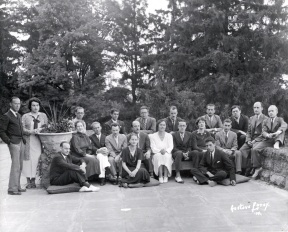
This is a new feature I might do — easy things to cook that are great. I figure I’m picking up where Mark Bittman is (sadly) leaving off.
The first recipe is an all-star one that I can make some version of at almost any time without shopping, provided I have some canned chickpeas (or white beans, or dried lentils, or I’m sure canned black beans would work). I usually have it with rice, which I always have in the house.
The first step is to chop (smallish) and saute whatever hard vegetables you have on hand. For me, this usually means some combination of carrots, onions, and maybe celery, though I’ve made it without some of those too. You can use anything that’s pretty hard. If you use potatoes or sweet potatoes, you might want to chop them extra-fine or even grate them. So, heat a few tablespoons of vegetable oil in a pot, add your chopped vegetables, and saute stirring occasionally for 5-10 minutes, until softened and maybe browned, or longer if you want to caramelize them. But they will keep cooking a little throughout the process. At the end of sauteing, throw in minced garlic if you like. Minced fresh ginger is good, too. If you have tomato paste, add a tablespoon or so now.
Next, add a can or two of drained and rinsed chickpeas (or other beans), as well as any soft vegetables you have around (except soft greens, which I’ll get to). This could mean eggplant, mushrooms, fresh or canned (with juice) tomatoes, summer squash. Canned tomatoes are probably the one I most frequently add. Then add some liquid, a cup or two depending on how much stuff is in the pot, enough to make it a little stew-like so it won’t burn. Tomato sauce, chicken broth, water, whatever you have. Then add curry powder, salt and pepper to taste. If you don’t have curry powder, add some combo of cumin, coriander, chili powder, cayenne, ground mustard, smoked paprika, garlic powder, onion powder.
Bring it all to a boil and then turn down immediately to a slow simmer. Stir occasionally. Cook until everything is at a nice, eatable consistency, say twenty minutes. At this point, stir in fresh or frozen spinach or something similar, if you have it (I don’t always), and cook until cooked (wilty-looking). If you have any parsley, cilantro, scallions, basil, or chives, chop some and add them. Then it is ready to eat with rice or any other cooked grain that you have cooked. In a pinch I have eaten it with toast. I would eat it with tortillas, if it came to that. It is really good with chili paste or hot sauce.
Again, this is really adaptable. Maybe all you have is carrots and chickpeas. That will still be really delicious if you add enough spice. The great thing about this dish is that you don’t have to have anything fresh–canned beans and tomatoes and some frozen spinach along with your dried spices work great. Leftovers are even better than the first go-round.




 elimae (1996-2010) was eliminated from this world due to fatal complications resulting from a malfunction in its bullshit detector. Efforts to resuscitate the detector failed; insiders who wish to remain anonymous told us, “The detector was just too delicately calibrated to be saved. It was the only thing keeping the magazine from publishing truly random word salad bullshit.” Sources concur that the detector was the secret weapon that allowed editors Cooper Renner and Kim Chinquee to respond to submissions within a week, usually much sooner. “No human acting alone can sift such gems out of so much masturbatory bullshit that quickly,” said an industry insider. As-yet-unconfirmed rumors report that the cause of the malfunction was a $1.2M re-engineering project that would have enabled the detector to reject realism-oriented writers who were even just thinking about submitting to the esteemed journal. Details continue to come to light.
elimae (1996-2010) was eliminated from this world due to fatal complications resulting from a malfunction in its bullshit detector. Efforts to resuscitate the detector failed; insiders who wish to remain anonymous told us, “The detector was just too delicately calibrated to be saved. It was the only thing keeping the magazine from publishing truly random word salad bullshit.” Sources concur that the detector was the secret weapon that allowed editors Cooper Renner and Kim Chinquee to respond to submissions within a week, usually much sooner. “No human acting alone can sift such gems out of so much masturbatory bullshit that quickly,” said an industry insider. As-yet-unconfirmed rumors report that the cause of the malfunction was a $1.2M re-engineering project that would have enabled the detector to reject realism-oriented writers who were even just thinking about submitting to the esteemed journal. Details continue to come to light.
 Online lit journals in general (1996-2010) met a tragic end in an apparent case of criminal neglect on the part of everyone who wasn’t in the current issue of one of them or planning to submit very soon. The exact time of death is unknown; at first, many writers just figured the new issues were just a little late going live, and nobody else noticed for as much as a month. The death was a shock to many who had long predicted the demise of print publications. “It seems like just yesterday that I was looking at online proofs for four different journals that I was supposed to be in. And now all my last-minute revisions will never find their audience.” said one mourner. More philosophically, a source who claims to be a “veteran” of what he calls “the scene,” noted, “I guess nobody reads online journals, either. People would “like” it on facebook if you linked to a journal you’re in, but maybe they weren’t clicking on the links. I probably have enough online cred already anyway. But I will miss being solicited.” 12 of the source’s friends “liked” this comment.
Online lit journals in general (1996-2010) met a tragic end in an apparent case of criminal neglect on the part of everyone who wasn’t in the current issue of one of them or planning to submit very soon. The exact time of death is unknown; at first, many writers just figured the new issues were just a little late going live, and nobody else noticed for as much as a month. The death was a shock to many who had long predicted the demise of print publications. “It seems like just yesterday that I was looking at online proofs for four different journals that I was supposed to be in. And now all my last-minute revisions will never find their audience.” said one mourner. More philosophically, a source who claims to be a “veteran” of what he calls “the scene,” noted, “I guess nobody reads online journals, either. People would “like” it on facebook if you linked to a journal you’re in, but maybe they weren’t clicking on the links. I probably have enough online cred already anyway. But I will miss being solicited.” 12 of the source’s friends “liked” this comment.


